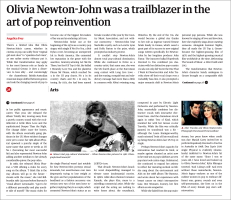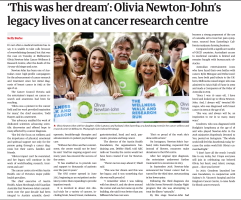A trailblazer in the art of pop reinvention
20sthanks to Kay


Olivia Newton-John was a trailblazer in the art of pop reinvention
By Angelica Frey
There’s a limited idea that Olivia Newton-John’s career, whether in cinema or pop, ran solely from virginal girl-next-door
to spandex-clad vixen
, as one rather snotty obituary put it. While that transformation may apply to her most famous role as Sandy in the musical Grease, it does a disservice to how ably – and convincingly – the chameleonic British-Australian musician shape-shifted between genres and rode the changing moods of pop to become one of the biggest hit-makers of her era and an enduring cult icon.
Newton-John broke out at the beginning of the 1970s as a country-pop singer, with single If Not For You, a Bob Dylan cover, becoming an unexpected hit in North America. She cemented her reputation in the genre with the assertive, Grammy-winning Let Me Be There, her first US Top 10 hit, the ballad I Honestly Love You and the plaintive Please Mr Please, which reached No 3 in the US pop charts, No 5 in its country charts and No 1 in easy listening. By 1974, she had been named female vocalist of the year by the Country Music Association, and not without controversy – Newton-John beat Nashville royalty such as Loretta Lynn and Dolly Parton to the prize, which prompted an industry protest.
It couldn’t stop Newton-John’s almost total pop-cultural domination. While she continued to thrive as a country artist, that same year, she won the UK fourth place at the Eurovision song contest with Long Live Love – and the rousing, oompah beat and valedictory message had more than a little in common with Abba’s winning song, Waterloo. By the end of the 70s, she would become a global star thanks to her role as ingenue turned femme fatale Sandy in Grease, which owed a great part of its success to new original songs written specifically for Newton-John by her longtime producer John Farrar. The innocent ballad Hopelessly Devoted to You combined 50s classicism with her distinctive pop-country vocals; not only did You’re the One That I Want let Newton-John and John Travolta show off their vocal chops over a rockabilly bass line, it also prompted a major semantic shift in Newton-John’s personal pop persona. While she was known for singing of love and devotion, here she explicitly sings about wanting someone. Alongside Summer Nights, they all made the US Top 5; Grease became the highest-grossing film of 1978, and the highest-grossing musical film worldwide at the time, dethroning The Sound of Music – a title it held until 2012.
The transformation that Newton-John’s character Sandy undergoes in Grease brought on a comparable shift in her public appearance and music career. That year, she released the album Totally Hot, moving away from a purely country sound with the rock-inflected A Little More Love and the sophisticated Deeper Than the Night. The change didn’t scare the horses, with the album eventually going platinum in the US. More strident changes were yet to come: her 1981 album Physical spawned a punchy single of the same name that spent 10 weeks as US No 1 (becoming her most successful hit) and also represented Newton-John adding another medium to her already considerable quiver: the pop video.
In 1982, she released Olivia Physical, a VHS offering a video for every song on the album. I think this is the way albums will go in the future – visuals with the music,
she told Billboard in 1981 (35 years before Beyoncé’s visual album
Lemonade). I got to be a different personality and play another side of myself.
The music video for the single Physical wasn’t just notable for how Newton-John portrays sexual innuendo, her assertiveness over men desperately trying to lose weight at the gym and her popularisation of the headband as a fashion accessory: one version sees two of the men leave together, implying they’re a couple, which cemented Newton-John’s status as an LGBTQ+ icon.
That decade, Newton-John’s knack for vocal shapeshifting managed to elevate some insubstantial movies. In 1980’s roller-disco-themed romance Xanadu, she plays Kira, muse to a snivelling commercial artist. While the script and the acting are nothing to write home about, the soundtrack, composed in part by Electric Light Orchestra and performed by Newton-John, masterfully combines her distinctive vocals with innovative electronic bass. And the chameleon struck again in 1983’s Two of Kind, which reunited her with her Grease co-star Travolta. While the film was critically panned, its soundtrack was a hit – although the Laura Branigan - worthy, synth-oriented Twist of Fate would end up being Newton-John’s last US Top 10 single.
Perhaps Newton-John’s capacity for reinvention had reached its limit; or maybe ageism shunted an artist now in her mid-30s to pop’s sidelines as teen pop stars took centre stage. Undeterred, she continued to expand her artistry to reflect her maturing outlook on life: she sang about the environment and Aids on her 1988 album The Rumour, and wrote about her experiences with breast cancer on 1994’s introspective Gaia: One Woman’s Journey, her first album as sole songwriter.
While she faded from the pop mainstream, her peers knew when credit was due: Mariah Carey invited her to perform Hopelessly Devoted to You live in Australia in 1998; Dua Lipa’s 2020 single Physical is evidently (shamelessly) indebted to Newton-John’s hit of the same name. Since I was 10 years old, I have loved and looked up to Olivia Newton-John,
Kylie Minogue tweeted. And I always will.
And even without those name checks, Newton-John’s legacy endures: as one of the earliest women in pop to embrace different eras, genres, sounds and even self-presentation, she lives on in the DNA of every female pop star’s self-reinvention.
This was her dream: Olivia Newton-John’s legacy lives on at cancer research centre
It’s not often a medical institute has to say it is unable to take calls because of overwhelming demand, but that was the case on Tuesday at Melbourne’s Olivia Newton-John Cancer Wellness & Research Centre, after the death of the 73-year-old singer and actor.
Newton-John has been one of Australia’s most high-profile campaigners for the advancement of cancer research and treatment since her initial diagnosis of breast cancer in 1992 at the age of 44.
The Cancer Council Victoria said the entertainer’s impact on cancer research and awareness had been far reaching.
Olivia was a pioneer in the cancer field and her work provided inspiration for many,
the chief executive, Todd Harper, said in a statement.
Her advocacy enabled the work of dedicated scientists advancing scientific discoveries and offered hope to many affected by a cancer diagnosis.
She led the focus on wellness and the importance of physical, emotional and spiritual support not only for the person going through a cancer diagnosis but their carers, families and friends.
Olivia’s impact can’t be overstated, and her legacy will continue in the work of world-leading research, treatment and care.
The cancer centre sits within Austin Health, one of Victoria’s major public health providers.
The chief executive of Austin Health, Adam Horsburgh, told Guardian Australia that Newtown-John’s commitment over the past decade had been integral to Austin’s scientific developments, breakthrough therapies and advancements in patient psychological care.
Without her drive and her commitment, the centre would not be here,
he said. And her ongoing support over many years has ensured the success of the centre. It has enabled us to provide care and support to thousands of patients over the past 10 years.
The ONJ centre opened in June 2012, beginning as an outpatient ambulatory centre then expanding to provide inpatient wards.
It is involved in about 200 clinical trials for a variety of cancers, including brain, bowel, breast, melanoma, gastrointestinal, head and neck, pancreatic, prostate and lung cancer.
The director of the Austin Health Foundation, the organisation’s fundraising arm, Debbie Shiell, told ABC radio on Tuesday the centre would not have been created if not for Newton-John.
There’s no two ways about it,
Shiell said.
This was her dream and this was her legacy, and it was something that she was really proud of. I remember when I was talking with her about it, and she drove around the corner and saw her name up on the building, she said it was better than any billboard she has ever seen.
She’s so proud of the work she’s done with us here.
On Instagram, Newton-John’s husband, John Easterling, requested that instead of flowers, mourners make donations to the ONJ centre.
After her original 1992 diagnosis, the entertainer underwent further treatment for a recurrence in 2013.
In September 2018, Newton-John announced her breast cancer had returned for the third time, metastasising in her lower spine.
Following the third diagnosis she told the Seven Network’s Sunday Night program that she was attempting to treat the illness naturally
.
By this stage Newton-John had become a strong proponent of the use of cannabis oil to treat her pain symptoms, sourced from Easterling’s California marijuana farming business. Compared with a significant swathe of OECD countries, Australian’s access to medicinal cannabis is limited and remains fraught with bureaucratic obstacles.
Australian entertainment icons who have faced their own battles with cancer, Kylie Minogue and Delta Goodrem, have both paid tribute to the UK-born, Melbourne-raised singer, who was admitted to Aria’s Hall of Fame in 2002 and made a Companion of the Order of Australia in 2019.
Since I was 10 years old, I have loved and looked up to Olivia Newton-John. And, I always will,
tweeted Minogue, who was diagnosed with breast cancer in 2005 at the age of 36. She was, and always will be, an inspiration to me in so many, many ways.
Goodrem, who was diagnosed with Hodgkin’s lymphoma at the age of 18 and who played Newton-John in the 2018 miniseries Hopelessly Devoted to You, posted on Instagram: The whole world will feel this heartbreak today because the entire world felt Olivia’s unmatched light.
I don’t have all the words I would like to say today, but I hope everyone will join in celebrating our beloved Olivia, her heart, soul, talent, courage, grace … I love you forever.
In 2020, Goodrem launched her own foundation, in conjunction with Sydney’s St. Vincent’s hospital and the Kinghorn Cancer Centre, to raise funds for blood cancer research.